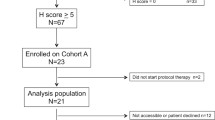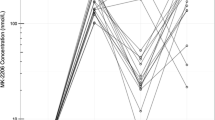Abstract
Purpose
Preclinical studies support the JAK2–STAT3 signaling pathway as a key driver in CD44+ CD24− “stem-cell-like” breast cancer cells. Ruxolitinib is an orally bioavailable JAK1/2 inhibitor. We aimed to identify the recommended phase 2 dose (RP2D) of ruxolitinib in combination with paclitaxel in patients with HER2-negative metastatic breast cancer (MBC).
Methods
Eligible patients had HER2-negative MBC and had received ≤ 3 chemotherapy regimens for advanced disease. Patients received oral ruxolitinib (10–25 mg bid) in a 3 + 3 dose escalation design in combination with weekly paclitaxel 80 mg/m2 in a 3-week cycle. The primary objective was to determine the maximum tolerated dose (MTD) and the RP2D.
Results
Nineteen patients received protocol therapy (mean age 52 years). Eight (42%) had triple-negative breast cancer and 11 (58%) had hormone receptor-positive disease; 12 (63%) had visceral disease. Ten (53%) patients had not received prior treatment for advanced disease. Patients received a median number of 5 cycles of combination therapy (range 1–12) and five patients continued single-agent ruxolitinib. The MTD of ruxolitinib was 25 mg bid when combined with paclitaxel, and the RP2D for the combination was 15 mg bid. Thirteen (68%) patients required dose reductions or holds. Most frequent toxicities reported of any grade were neutropenia (50%) and anemia (33%). There were no grade 4/5 toxicities attributed to study drug. Four (21%) patients had PR, 12 (63%) had SD and three (16%) had PD as their best response.
Conclusion
The combination of ruxolitinib and weekly paclitaxel was well tolerated with evidence of clinical activity. Further analysis of this combination is ongoing (NCT02041429).
Trial registration
NCT02041429. Date of registration: January 22, 2014.
Similar content being viewed by others
Data availability
The datasets generated during and/or analyzed during the current study are available from the corresponding author on reasonable request.
Code availability
Not applicable.
References
Marotta LL, Almendro V, Marusyk A, Shipitsin M, Schemme J, Walker SR, Bloushtain-Qimron N, Kim JJ, Choudhury SA, Maruyama R, Wu Z, Gonen M, Mulvey LA, Bessarabova MO, Huh SJ, Silver SJ, Kim SY, Park SY, Lee HE, Anderson KS, Richardson AL, Nikolskaya T, Nikolsky Y, Liu XS, Root DE, Hahn WC, Frank DA, Polyak K (2011) The JAK2/STAT3 signaling pathway is required for growth of CD44(+)CD24(−) stem cell-like breast cancer cells in human tumors. J Clin Invest 121(7):2723–2735. https://doi.org/10.1172/JCI44745
Xiao Y, Ye Y, Yearsley K, Jones S, Barsky SH (2008) The lymphovascular embolus of inflammatory breast cancer expresses a stem cell-like phenotype. Am J Pathol 173(2):561–574. https://doi.org/10.2353/ajpath.2008.071214
Overmoyer BA, Almendro V, Shuh S, Peluffo G, Park SY, Nakhlis F, Bellon J, Yeh E, Hirshfield-Bartek J, Jacene HA, Polyak K (2012) JAK2/STAT3 activity in inflammatory breast cancer supports the investigation of JAK2 therapeutic targeting. Cancer Res 72(3):24 (P4-06-01)
Stover DG, Alcazar CRGD, Brock J, Guo H, Overmoyer B, Balko J, Xu Q, Bardia A, Tolaney SM, Gelman R, Lloyd M, Wang Y, Xu Y, Michor F, Wang V, Winer EP, Polyak K, Lin NU (2018) Phase II study of ruxolitinib, a selective JAK1/2 inhibitor, in patients with metastatic triple-negative breast cancer. NPJ Breast Cancer 4(1):10. https://doi.org/10.1038/s41523-018-0060-z
Bauer TM, Patel MR, Forero-Torres A, George TJ Jr, Assad A, Du Y, Hurwitz H (2018) A phase Ib study of ruxolitinib + gemcitabine +/− nab-paclitaxel in patients with advanced solid tumors. Onco Targets Ther 11:2399–2407. https://doi.org/10.2147/OTT.S157331
Hurwitz HI, Uppal N, Wagner SA, Bendell JC, Beck JT, Wade SM, Nemunaitis JJ, Stella PJ, Pipas JM, Wainberg ZA, Manges R, Garrett WM, Hunter DS, Clark J, Leopold L, Sandor V, Levy RS (2015) Randomized, double-blind, phase II study of ruxolitinib or placebo in combination with capecitabine in patients with metastatic pancreatic cancer for whom therapy with gemcitabine has failed. J Clin Oncol 33(34):4039–4047. https://doi.org/10.1200/JCO.2015.61.4578
Harrison C, Kiladjian J-J, Al-Ali HK, Gisslinger H, Waltzman R, Stalbovskaya V, McQuitty M, Hunter DS, Levy R, Knoops L, Cervantes F, Vannucchi AM, Barbui T, Barosi G (2012) JAK inhibition with ruxolitinib versus best available therapy for myelofibrosis. N Engl J Med 366(9):787–798. https://doi.org/10.1056/NEJMoa1110556
Verstovsek S, Mesa RA, Gotlib J, Levy RS, Gupta V, DiPersio JF, Catalano JV, Deininger M, Miller C, Silver RT, Talpaz M, Winton EF, Harvey JH, Arcasoy MO, Hexner E, Lyons RM, Paquette R, Raza A, Vaddi K, Erickson-Viitanen S, Koumenis IL, Sun W, Sandor V, Kantarjian HM (2012) A double-blind, placebo-controlled trial of ruxolitinib for myelofibrosis. N Engl J Med 366(9):799–807. https://doi.org/10.1056/NEJMoa1110557
Zeiser R, von Bubnoff N, Butler J, Mohty M, Niederwieser D, Or R, Szer J, Wagner EM, Zuckerman T, Mahuzier B, Xu J, Wilke C, Gandhi KK, Socie G, REACH2 Trial Group (2020) Ruxolitinib for glucocorticoid-refractory acute graft-versus-host disease. N Engl J Med 382(19):1800–1810. https://doi.org/10.1056/NEJMoa1917635
Han ES, Wen W, Dellinger TH, Wu J, Lu SA, Jove R, Yim JH (2018) Ruxolitinib synergistically enhances the anti-tumor activity of paclitaxel in human ovarian cancer. Oncotarget 9(36):24304–24319. https://doi.org/10.18632/oncotarget.24368
Deisseroth A, Kaminskas E, Grillo J, Chen W, Saber H, Lu HL, Rothmann MD, Brar S, Wang J, Garnett C, Bullock J, Burke LB, Rahman A, Sridhara R, Farrell A, Pazdur R (2012) U.S. food and drug administration approval: ruxolitinib for the treatment of patients with intermediate and high-risk myelofibrosis. Clin Cancer Res 18(12):3212–3217. https://doi.org/10.1158/1078-0432.CCR-12-0653
Taxol (paclitaxel) (prescribing information). Princeton, NJ: Bristol-Myers Squibb Company; April 2011. https://www.accessdata.fda.gov/drugsatfda_docs/label/2015/020262s051lbl.pdf Accessed 11 Feb 2021
Paller CJ, Bradbury PA, Ivy SP, Seymour L, LoRusso PM, Baker L, Rubinstein L, Huang E, Collyar D, Groshen S, Reeves S, Ellis LM, Sargent DJ, Rosner GL, LeBlanc ML, Ratain MJ (2014) Design of phase I combination trials: recommendations of the clinical trial design task force of the NCI investigational drug steering committee. Clin Cancer Res 20(16):4210–4217. https://doi.org/10.1158/1078-0432.CCR-14-0521
Incyte Corporation (2019) JAKAFI prescribing information. Wilmington, DE, USA. https://www.accessdata.fda.gov/drugsatfda_docs/label/2019/202192s017lbl.pdf Accessed 11 February 2021
Hance KW, Anderson WF, Devesa SS, Young HA, Levine PH (2005) Trends in inflammatory breast carcinoma incidence and survival: the surveillance, epidemiology, and end results program at the National Cancer Institute. J Natl Cancer Inst 97(13):966–975. https://doi.org/10.1093/jnci/dji172
Anderson WF, Chu KC, Chang S (2003) Inflammatory breast carcinoma and noninflammatory locally advanced breast carcinoma: distinct clinicopathologic entities? J Clin Oncol 21(12):2254–2259. https://doi.org/10.1200/JCO.2003.07.082
Walshe JM, Swain SM (2005) Clinical aspects of inflammatory breast cancer. Breast Dis 22:35–44
Funding
Incyte Corporation, Alapocas, Delaware.
Author information
Authors and Affiliations
Corresponding author
Ethics declarations
Conflicts of interest
FL has received research grants from Pfizer, Immunomedics, Regeneron, Chugai, Tesaro, Calithera, Inivata and BMS and has participated on advisory boards from Pfizer (remunerated) and BMS, Astra Zeneca and Jounce (non remunerated). BO has received clinical trial support from Incyte, Eisai. SMT receives institutional research funding from AstraZeneca, Lilly, Merck, Nektar, Novartis, Pfizer, Genentech/Roche, Immunomedics, Exelixis, Bristol-Myers Squibb, Eisai, Nanostring, Cyclacel, Odonate, and Seattle Genetics; has served as an advisor/consultant to AstraZeneca, Lilly, Merck, Nektar, Novartis, Pfizer, Genentech/Roche, Immunomedics, Bristol-Myers Squibb, Eisai, Nanostring, Puma, Sanofi, Celldex, Paxman, Puma, Silverback Therapeutics, G1 Therapeutics, AbbVie, Anthenex, OncoPep, Outcomes4Me, Kyowa Kirin Pharmaceuticals, Daiichi-Sankyo, and Samsung Bioepsis Inc. RAF receives institutional funding from Eisai and Puma Biotechnology. ELM has served as a consultant/advisor to Novartis, Lilly, Sanofi, and Eisai. MMR reports research funding from Novartis, Pfizer, Ipsen, TerSera, Merck, Pierre Fabre, Roche, AstraZeneca, Bristol Myers Squibb, Bayer, Veridex; and consulting or advisory role for Ipsen, Bristol-Myers Squibb, Tolmar Pharmaceuticals.
Ethics approval
This study was approved by the Dana-Farber/Harvard Cancer Center Institutional Review Board (DFCI#13–494; NCT02041429).
Consent to participate
Informed consent was obtained from all subjects.
Consent for publication
Not applicable.
Additional information
Publisher's Note
Springer Nature remains neutral with regard to jurisdictional claims in published maps and institutional affiliations.
Prior presentation: San Antonio Breast Cancer Symposium 2016 (Overmoyer B, Regan M et al. Abstract P6-12-12: Phase I study of the JAK1/2 inhibitor ruxolitinib with weekly paclitaxel for the treatment of HER2 negative metastatic breast cancer (MBC). Cancer Res 2017; 77(4 Supplement): P6-12-12.
Rights and permissions
About this article
Cite this article
Lynce, F., Williams, J.T., Regan, M.M. et al. Phase I study of JAK1/2 inhibitor ruxolitinib with weekly paclitaxel for the treatment of HER2-negative metastatic breast cancer. Cancer Chemother Pharmacol 87, 673–679 (2021). https://doi.org/10.1007/s00280-021-04245-x
Received:
Accepted:
Published:
Issue Date:
DOI: https://doi.org/10.1007/s00280-021-04245-x




